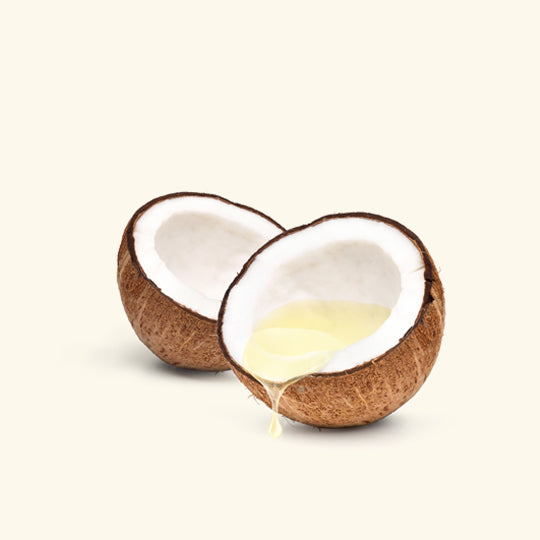Dry eye syndrome can cause your eyes to burn, ache, or appear grittier. This is frequently caused by insufficient or poor-quality sobbing. Dry eyes can be caused by various factors, including medications you're taking, time spent staring at a screen without moving, exposure to smoky or dry air, wearing corrective lenses, and becoming older.

It aches a lot, no matter what the cause is. Not to worry; even if you're confined to your home and excessively withdrawn to ensure your safety, you can still seek relief from your unpleasant side effects. Instead of eye drops and ocular fluids, you could try a natural cure for dry eyes made with virgin coconut oil. This oil is an excellent technique to cure dry eyes, as we will see in this blog.
Coconut Oil Benefits For Dry Eyes
Coconut oil is a natural and relaxing solution for dry eyes, relieving irritation and improving general eye health. Its distinct qualities make it a valuable treatment for dry eye issues.
- Moisturizing Properties: Coconut oil has emollient characteristics, which provide a protective coating that aids in the retention of moisture in the eyes. It contains saturated fats that are easily absorbed and can moisturize the eye's surface, such as medium-chain triglycerides (MCTs).
- Anti-Inflammatory Effects: Coconut oil includes anti-inflammatory chemicals such as lauric acid, capric acid, and caprylic acid. Inflammation in the eyes, frequently associated with disorders such as dry eyes, can be lessened, relieving discomfort.

- Rich in Fatty Acids: Coconut oil contains essential fatty acids such as linoleic and oleic. These acids contribute to the tear film's lipid layer. The lipid layer of the tear film prevents tears from evaporating too quickly, keeping the eye's surface wet.
- Antimicrobial Properties: The main component of coconut oil, lauric acid, has antimicrobial and antibacterial effects. These qualities can help protect the eyes from microbial infections, lowering the risk of dry eye problems.
- Easy Application: Coconut oil is simple to apply with a clean fingertip or a cotton swab, making it an easy addition to a daily eye care routine. Its ease of use encourages constant use, providing consistent hydration and general eye health.
How to Use Coconut Oil For Dry Eyes Treatment?
Using coconut oil for dry eyes is a simple and natural way to relieve irritation and increase eye moisture. Here's a quick approach to incorporating coconut oil into your dry eye care routine.
Step 1: Before applying coconut oil to your eyes, carefully clean your hands. This helps to eliminate any potential contamination.

Step 2: Choose high-quality virgin coconut oil, ideally organic, to assure purity and maximize the advantages for your eyes.
Step 3: Scoop a small amount of coconut oil into a clean container. Warm the oil gently by rubbing it between your fingers or with a clean spoon. Warming the oil slightly helps it become more liquid and simpler to apply.
Step 4: Close your eyes and dab a tiny amount of warmed coconut oil on your upper and lower eyelids. Use your fingers or a clean cotton swab to apply the product precisely.
Step 5: Rub the coconut oil into your eyelids in slow, circular strokes with your eyes closed. This improves absorption while also stimulating the oil glands around the eyes.
Step 6: Leave the coconut oil on overnight for best results. You can, however, use it as needed during the day for immediate relief. Consider using a modest amount during the day to minimize any transient blurring of eyesight.
Step 7: Adjust the frequency of the application depending on the severity of your dry eye problems. You may notice an improvement in eye comfort and moisture levels over time.
Frequently Asked Questions
Are you interested in using coconut oil to treat dry eyes? Investigate the following commonly asked questions to learn more about its effectiveness, application, and potential advantages for treating dry eyes and skin around the eyes.

Q1: Does Coconut Oil Help With Dry Eyes?
Ans: Yes, coconut oil's moisturizing properties can relieve dry eyes by reducing inflammation and promoting general eye health.
Q2: Can Coconut Oil Be Used For Dry Eyes?
Ans: Coconut oil can be used to treat dry eyes. Its natural characteristics make it a convenient and relaxing treatment for dry eyes.
Q3: Is Coconut Oil Good For Dry Skin Around the Eyes?
Ans: Indeed. Coconut oil's hydrating and anti-inflammatory properties make it useful for addressing dry skin around the eyes, offering nourishment and moisture.
Conclusion
Allergies, the environment, and various other causes can cause dry eyes. On the other hand, making a few changes and using natural therapies like coconut oil can often reverse symptoms. Consult your doctor if your dry eyes do not improve with self-care. They can identify the source of the dryness and propose a suitable treatment. Visit www.VedaOils.com for high-quality, low-cost coconut oil for dry eyes.











 Sign in
Sign in Register now
Register now My Reward Points
My Reward Points









